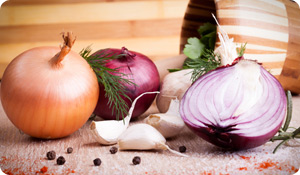
Itís known that healthy gut bacteria promote good physical health, but the idea that prebiotics, non-digestible ingredients in certain foods that increase the activity of "good" bacteria in the stomach, could be good for your mental health is more novel. Nonetheless, thatís what a new study in Psychopharmacology suggests.
In the British study, 45 participants took either 5.5 grams of a commercial prebiotic supplement called Bimuno or a placebo every day, sprinkling the soluble powder on cereal or adding it to a hot drink. Then the subjects worked on some computer tests meant to determine how they processed emotional information. Those who took the prebiotic not only paid less attention to negative information and more attention to positive information than those who took the placebo, but they had lower levels of the hormone cortisol in their saliva. Elevated cortisol levels have been linked to anxiety and stress.
Exactly how prebiotics work to stave off anxiety is not clear, says study lead author Phil Burnet, PhD, who is based in the University of Oxfordís Department of Psychiatry at Warneford Hospital in Oxford, England. "We think that it may be linked to the effect of gut bacteria on the immune system, which then affects the brain," he says. "Increasing good gut bacteria appear to lower the natural inflammatory response, which is good for the brain and other organs."
And, Burnet adds, "The growth of beneficial bacteria also leads to the production of other biochemicals and vitamins that affect the brain. We are currently investigating the mechanisms."
This research may be among the first to look at prebiotics in humans, says Scott Krakower, DO, assistant unit chief of psychiatry at Zucker Hillside Hospital in Glen Oaks, NY. "The study will provide a foundation for further research with prebiotics and their role with potentially treating neuropsychiatric disorders for the future," Krakower says. "While prebiotics have been rarely studied, there has been more literature coming out with probiotics and their role on reduced stress response. The literature results still can be mixed, and we have to be careful not to overgeneralize the data."
Prebiotics and Probiotics
Prebiotics are different from probiotics, which contain live microorganisms that balance the bacteria in our intestines, explains Susie Bond, RDN, LDN, of Health First in Melbourne, Florida. "Probiotics are what play an important role in protecting our health by helping with digestion, immunity, keeping harmful bacteria from spreading, and by preventing infections." Probiotics are commonly found in foods like yogurt.
Prebiotics, on the other hand, "are a non-digestible, non-absorbable food ingredient that stimulates the growth and activity of the good bacteria in your intestine," explains M. Cecelia Lacayo, MD, diplomat of the American Board of Integrative Holistic Medicine. Prebiotics are found in a variety of foods, especially certain vegetables.
And they are invaluable as a health aide, she adds: "They stimulate the immune system and help protect against heart disease and diabetes. Prebiotics also give you energy and they help with the absorption of minerals like calcium and magnesium."
Prebiotics in Your Diet
Itís crucial to eat foods that contain prebiotics regularly, Lacayo says. "I encourage you to eat eight to 12 portions a day." (A portion is one half cup cooked, or one cup raw.) "The best way to eat them is raw, but you could also lightly steam or sautť them."
Prebiotics can be found in these foods:
- Bananas
- Onions
- Garlic
- Asparagus
- Chicory root
- Oats
- Leafy greens
- Legumes
- Barley
- Honey
While eating foods with prebiotics is important, itís possible to overdo it, Lacayo says: "If you have bloating or gassiness, this tells you that you have had too much for your body, and that you should cut back." Burnet adds that the volunteers in his research study were given "the amounts (of prebiotics) recommended by the manufacturers. Using more than this does not give any added benefits."
Furthermore, prebiotics should not be thought of as the sole cure for anxiety, so speak to your doctor about your treatment options: "Prebiotics are not an alternative to conventional anti-anxiety medicines," Burnet cautions. "So if anxious people are on medications, they should not replace this with pre/probiotics. Relatively healthy people who may feel a bit anxious could try taking prebiotics."
Scott Krakower, DO, reviewed this article.
Sources
Susie Bond, RDN, LDN. Email interview. December 31, 2014.
Phil Burnet, PhD. Email interview on January 5, 2015.
Scott Krakower, DO. Phone interview. December 22, 2014.
M. Cecelia Lacayo, MD. Phone interview. January 2, 2015.
Schmidt, Kristin et al. "Prebiotic Intake Reduces the Waking Cortisol Response and Alters Emotional Bias in Healthy Volunteers." Psychopharmacology 2014. Posted December 3, 2014.
"Foods Containing Prebiotics." Prebiotin.com. September 20, 2010.
Newgent, Jackie, RDN, CDN. "Prebiotics and Probiotics: The Dynamic Duo." Eatright.org/Academy of Nutrition and Dietetics. Page last reviewed June 2013.





